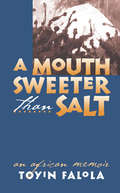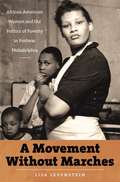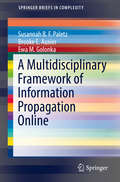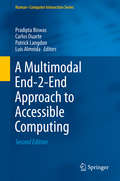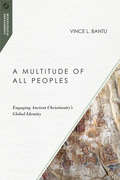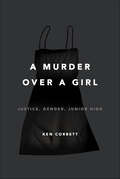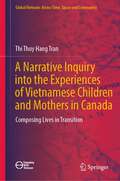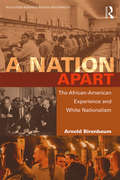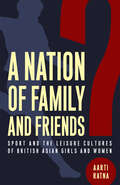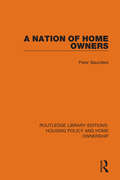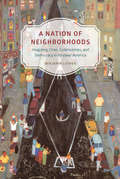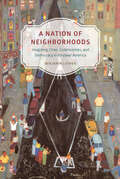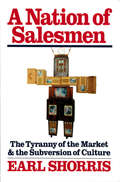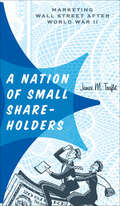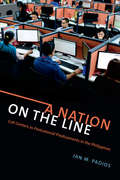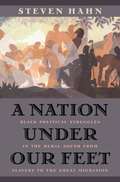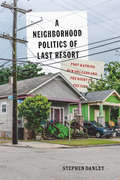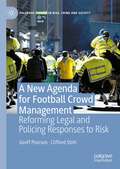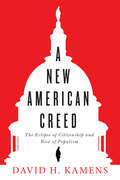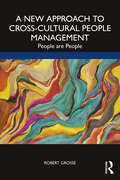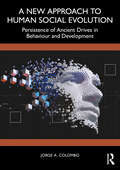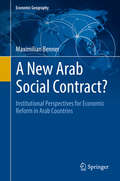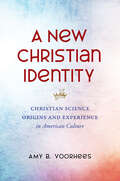- Table View
- List View
A Mouth Sweeter than Salt: An African Memoir
by Toyin FalolaA Mouth Sweeter Than Salt gathers the stories and reflections of the early years of Toyin Falola, the grand historian of Africa and one of the greatest sons of Ibadan, the notable Yoruba city-state in Nigeria. Redefining the autobiographical genre altogether, Falola miraculously weaves together personal, historical, and communal stories, along with political and cultural developments in the period immediately preceding and following Nigeria's independence, to give us a unique and enduring picture of the Yoruba in the mid-twentieth century. This is truly a literary memoir, told in language rich with proverbs, poetry, song, and humor. Falola's memoir is far more than the story of one man's childhood experiences; rather, he presents us with the riches of an entire culture and community--its history, traditions, pleasures, mysteries, household arrangements, forms of power, struggles, and transformations.
A Movement Without Marches
by Lisa LevensteinLisa Levenstein reframes highly charged debates over the origins of chronic African American poverty and the social policies and political struggles that led to the postwar urban crisis. A Movement Without Marches follows poor black women as they traveled from some of Philadelphia's most impoverished neighborhoods into its welfare offices, courtrooms, public housing, schools, and hospitals, laying claim to an unprecedented array of government benefits and services. With these resources came new constraints, as public officials frequently responded to women's efforts by limiting benefits and attempting to control their personal lives. Scathing public narratives about women's "dependency" and their children's "illegitimacy" placed African American women and public institutions at the center of the growing opposition to black migration and civil rights in northern U.S. cities. Countering stereotypes that have long plagued public debate, Levenstein offers a new paradigm for understanding postwar U.S. history.
A Multidisciplinary Framework of Information Propagation Online (SpringerBriefs in Complexity)
by Susannah B. Paletz Brooke E. Auxier Ewa M. GolonkaThis book presents a broad, multidisciplinary review of the factors that have been shown to or might influence sharing information on social media, regardless of its veracity. Drawing on literature from psychology, sociology, political science, communication, and information studies, the book provides a high-level framework of information sharing. The framework progresses through different categories. Information is first acquired or viewed from different sources; then, the target sharer has emotional and cognitive reactions to that information. The next categories involve motivations to share and the actual ability and perceptions of that ability to share. The greater context, such as culture, language, and social networks, also influences information sharing. Finally, the book distinguishes between genuine and non-genuine (inauthentic) actors. This text will appeal to students and especially to technical researchers looking for a social science perspective.
A Multimodal End-2-End Approach to Accessible Computing (Human–Computer Interaction Series)
by Pradipta Biswas Patrick Langdon Luis Almeida Carlos DuarteThis book illustrates how Interactive Systems can help elderly and disabled populations engage with the world around them by finding methods of overcoming the difficulties these communities face when using such systems by presenting the latest in state-of-the-art technology and providing a vision for accessibility for the near future. The challenges faced by accessibility practitioners are discussed and the different phases of delivering accessible products and services are explored. A collection of eminent researchers from around the world cover topics on developing and standardizing user models for inclusive design, adaptable multimodal system development for digital TV and ubiquitous devices, presenting research on intelligent voice recognition, adaptable pointing, browsing and navigation, and affect and gesture recognition. The research not only focuses on how these can be hugely beneficial to primary users, but often finding useful applications for their able-bodied counterparts. For this new edition, new chapters have been added focusing on the latest developments in games for the visually impaired, inclusive interfaces for the agricultural industry in India and technologies to improve accessibility in broadcasting in Japan. A Multimodal End-2-End Approach to Accessible Computing will be an invaluable resource for both researchers and practitioners alike.
A Multitude of All Peoples: Engaging Ancient Christianity's Global Identity (Missiological Engagements)
by Vince L. Bantubecomingalways beenA Multitude of All Peoples
A Murder Over a Girl: Justice, Gender, Junior High
by Ken CorbettTheNew York Times Book Review Editors' ChoiceA psychologist's gripping, troubling, and moving exploration of the brutal murder of a possibly transgender middle school student by an eighth grade classmateOn Feb. 12, 2008, at E. O. Green Junior High in Oxnard, CA, 14-year-old Brandon McInerney shot and killed his classmate, Larry King, who had recently begun to call himself "Leticia" and wear makeup and jewelry to school. Profoundly shaken by the news, and unsettled by media coverage that sidestepped the issues of gender identity and of race integral to the case, psychologist Ken Corbett traveled to LA to attend the trial. As visions of victim and perpetrator were woven and unwoven in the theater of the courtroom, a haunting picture emerged not only of the two young teenagers, but also of spectators altered by an atrocity and of a community that had unwittingly gestated a murder. Drawing on firsthand observations, extensive interviews and research, as well as on his decades of academic work on gender and sexuality, Corbett holds each murky facet of this case up to the light, exploring the fault lines of memory and the lacunae of uncertainty behind facts. Deeply compassionate, and brimming with wit and acute insight, A Murder Over a Girl is a riveting and stranger-than-fiction drama of the human psyche.
A Narrative Inquiry into the Experiences of Vietnamese Children and Mothers in Canada: Composing Lives in Transition (Global Vietnam: Across Time, Space and Community)
by Thi Thuy TranThis book recounts the understanding of three Vietnamese children and their mothers’ experiences as they navigate being newcomers to Canada. It explores the cultural, traditional, familial, intergenerational, personal, social, institutional, political, historical, community, and linguistic narratives shaping Vietnamese children and mothers as they compose their lives. The author employs narrative inquiry as a methodological approach, beginning by positioning herself through her narrative beginnings, delving deep into philosophical and methodological underpinnings. The author lays out the three child–mother pairs’ experiences as they negotiated a new culture in Canada, particularly the spaces of home, schools, and communities. The book brings a holistic and relational way of understanding familial curriculum-making as support for children’s school curriculum-making and for the ways in which Vietnamese families’ sustain their ongoing life making. It also looks at the influence of the homeland’s language, culture, and educational traditions. Through the complex interplay between the children and mothers’ narratives and the writer’s own stories, this book discusses multiperspectival and multidimensional ways of supporting Vietnamese newcomers and other ‘arrivals’ composing their lives in similar landscapes. The book is relevant to educators, researchers, cultural brokers, and policymakers, opening avenues for understanding cultural ethics within the relational ethics of narrative inquiry, as well as familial narratives in relation to institutional and social narratives.
A Nation Apart: The African-American Experience and White Nationalism (Routledge Research in Race and Ethnicity)
by Arnold BirenbaumThis book examines the ongoing struggle for social justice by and for African Americans. Examining the persistent rolling back of civil and voting rights for this population and other minorities since the end of Reconstruction, the author discusses the continued colonization of African Americans and the rise of white nationalism before considering what can be done to create a democratic version of Americanism. With discussions on the possibilities that exist for eliminating health disparities, increasing income and reducing wealth inequality, enhancing the urban environment and housing stability, reforming criminal justice, and reconsidering the case for reparations for the descendants of slaves, the author considers whether white nationalism is a threat to Democratic Americanism and if the declining fortunes of working class Americans can be reversed by means of a "Marshall Plan" for the United States. A study of the sustained racial injustices of American society over the last century and a half and their possible remedies, A Nation Apart will appeal to all those with interests in race and ethnicity and questions of social justice.
A Nation In Denial: The Truth About Homelessness
by Alice S. BaumThis book presents a comprehensive review of the scientific evidence that up to 85 percent of all homeless adults suffer the ravages of substance abuse and mental illness, resulting in the social isolation that has been the hallmark of homelessness in the United States since colonial days. .
A Nation of Family and Friends?: Sport and the Leisure Cultures of British Asian Girls and Women (Critical Issues in Sport and Society)
by Aarti RatnaIn A Nation of Family and Friends, sociologist Aarti Ratna examines the complex and dynamic relationships between South Asian women and sporting and leisure cultures. Mining autobiographical insights (as a South Asian scholar living in the UK) she links the chapters of this innovative book using the sociological concepts of family and friends, particularly as they relate to an analysis of wider debates about the complexities of race, gender, and the nation. Ratna underscores the importance of studying informal spaces of sport and leisure as friendly, familial, sociable, and political spaces. She simultaneously highlights the role of earlier sociological research in disseminating myths about South Asian women as too physically weak to play competitive sports; culturally passive victims of South Asian cultures and religions; and as sexually exotic women requiring saving through colonial and imperial projects led by white men and women. Ratna also examines two key cultural objects - the popular films "Bend it Like Beckham" and “Dhan Dhana Dhan Goal” - to examine in detail the gendered representation of South Asian soccer players’ engagement in amateur and elite levels of the sport. She critiques studies of women’s football fandom and sport that fail to acknowledge social differences relating to race, class, age, disability, and sexuality. By linking the social forces (across time and space) that differentially affect their sporting choices and leisure lifestyles, Ratna portrays the women of the South Asian diaspora as active agents in the shaping of their life courses and as skilled navigators of the complexities affecting their own identities. Ultimately Ratna examines the intersections of class, caste, age, generation, gender, and sexuality, to provide a rich and critical exploration of British Asian women's sport and leisure choices, pleasures, and lived realities.
A Nation of Home Owners: What Went Wrong With Home Ownership In Britai, How To Start Putting It Right
by Peter SaundersOriginally published in 1990, and re-issued in 2020 with an updated Preface, this book shows how the UK has become a nation of home owners, and the effect it has had on people’s lives, the impact which it has had on British society and the implications for those who have hitherto been excluded. The book briefly charts the history of the growth of owner-occupation in Britain and considers the evidence on the popularity of owning as opposed to renting. The question of whether and how owner occupiers accumulate wealth from their housing is discussed and the evidence on the political implications of the growth of owner-occupation examined. The influence of buying a house on the way that home is experienced is analysed and the sociological implications in regard to the analysis of social inequalities in Britain discussed. The research for the book was based on in-depth interviews with home-owners and tenants in Burnley, Derby and Slough.
A Nation of Immigrants
by Susan F. MartinImmigration makes America what it is and is formative for what it will become. America was settled by three different models of immigration, all of which persist to the present. The Virginia Colony largely equated immigration with the arrival of laborers, who had few rights. Massachusetts welcomed those who shared the religious views of the founders but excluded those whose beliefs challenged the prevailing orthodoxy. Pennsylvania valued pluralism, becoming the most diverse colony in religion, language, and culture. This book traces the evolution of these three models of immigration as they explain the historical roots of current policy debates and options. Arguing that the Pennsylvania model has best served the country, the final chapter makes recommendations for future immigration reform. Given the highly controversial nature of immigration in the United States, this book provides thoughtful analysis, valuable to both academic and policy audiences.
A Nation of Neighborhoods: Imagining Cities, Communities, and Democracy in Postwar America
by Benjamin LookerDespite the pundits who have written its epitaph and the latter-day refugees who have fled its confines for the half-acre suburban estate, the city neighborhood has endured as an idea central to American culture. In A Nation of Neighborhoods, Benjamin Looker presents us with the city neighborhood as both an endless problem and a possibility. Looker investigates the cultural, social, and political complexities of the idea of "neighborhood" in postwar America and how Americans grappled with vast changes in their urban spaces from World War II to the Reagan era. In the face of urban decline, competing visions of the city neighborhood's significance and purpose became proxies for broader debates over the meaning and limits of American democracy. By studying the way these contests unfolded across a startling variety of genres--Broadway shows, radio plays, urban ethnographies, real estate documents, and even children's programming--Looker shows that the neighborhood ideal has functioned as a central symbolic site for advancing and debating theories about American national identity and democratic practice.
A Nation of Neighborhoods: Imagining Cities, Communities, and Democracy in Postwar America (Historical Studies of Urban America)
by Benjamin LookerDespite the pundits who have written its epitaph and the latter-day refugees who have fled its confines for the half-acre suburban estate, the city neighborhood has endured as an idea central to American culture. In A Nation of Neighborhoods, Benjamin Looker presents us with the city neighborhood as both an endless problem and a possibility. Looker investigates the cultural, social, and political complexities of the idea of “neighborhood” in postwar America and how Americans grappled with vast changes in their urban spaces from World War II to the Reagan era. In the face of urban decline, competing visions of the city neighborhood’s significance and purpose became proxies for broader debates over the meaning and limits of American democracy. By studying the way these contests unfolded across a startling variety of genres—Broadway shows, radio plays, urban ethnographies, real estate documents, and even children’s programming—Looker shows that the neighborhood ideal has functioned as a central symbolic site for advancing and debating theories about American national identity and democratic practice.
A Nation of Salesmen: The Tyranny of the Market and the Subversion of Culture
by Earl ShorrisIf Adam is the archetype of man, and Eve of woman, then the serpent who sold the apple to Eve in the Garden of Eden was the first salesman: all culture and commerce flow from that act. In this groundbreaking book on the nature and meaning of the sale, Earl Shorris takes us on a journey that starts in Eden and comes at last to a consideration of where we are and what we have become in late twentieth-century America, where selling has finally become the dominant human activity. Shorris focuses on the perfection of this particular art here in America, where the vast frontier with its isolated settlements cast the salesman in a heroic role: he was literally the bearer of culture, the source of a panoply of needed and wanted items, everything from parasols to plowshares. He was Prometheus. All of this changed dramatically in the years following World War II, when it dawned on manufacturers and sellers that the American economy was producing more goods than people wanted or needed. Demand would have to be created in order to sustain the expansion of markets, and then, as the economy became oversold, the role of the salesman changed: his task was now to kill the competition. The argument of this brilliant work draws on classical philosophy, contemporary politics, psychology, and economics; it is grounded in the author's long experience as an advertising executive and consultant to major corporations. His firsthand observations and interviews with salesmen of every description form the anecdotal bedrock of the narrative, which is further enlivened by a series of fictions in which salesmen practice aspects of their trade. Out of these stories and insights emerges a chilling new paradigm of humanlife in our times: that of homo vendens. Shorris shows us how America became a nation of salesmen, and what this means to our economy, our politics, our culture, and our character - especially our freedom to live as dignified persons.
A Nation of Small Shareholders: Marketing Wall Street After World War II (Studies in Industry and Society)
by Janice M. TrafletThe little-known story of Wall Street’s effort to court individual investors during the Cold War in order to build a bulwark against communism.Immediately after the frightening Great Crash of 1929, many Americans swore they would never—or never again—become involved in the stock market. Yet hordes of Americans eventually did come to embrace equity investing, to an extent actually far greater than the level of popular involvement in the market during the Roaring Twenties. A Nation of Small Shareholders explores how marketers at the New York Stock Exchange during the mid-twentieth century deliberately cultivated new individual shareholders.Janice M. Traflet examines the energy with which NYSE leaders tried to expand the country’s retail investor base, particularly as the Cold War emerged and then intensified. From the early 1950s until the 1970s, Exchange executives engaged in an ambitious and sometimes controversial marketing program known as “Own Your Share of America,” which aimed to broaden the country’s shareholder base. The architects of the marketing program ardently believed that widespread share ownership would strengthen “democratic capitalism”—which, in turn, would serve as an effective barrier to the potential allure of communism here in the United States.Based on extensive primary source research, A Nation of Small Shareholders illustrates the missionary zeal with which Big Board leaders during the Cold War endeavored to convince factions within the Exchange, as well as the public, of the practical and ideological importance of building a true shareholder nation.
A Nation on the Line: Call Centers as Postcolonial Predicaments in the Philippines
by Jan M. PadiosIn 2011 the Philippines surpassed India to become what the New York Times referred to as "the world's capital of call centers." By the end of 2015 the Philippine call center industry employed over one million people and generated twenty-two billion dollars in revenue. In A Nation on the Line Jan M. Padios examines this massive industry in the context of globalization, race, gender, transnationalism, and postcolonialism, outlining how it has become a significant site of efforts to redefine Filipino identity and culture, the Philippine nation-state, and the value of Filipino labor. She also chronicles the many contradictory effects of call center work on Filipino identity, family, consumer culture, and sexual politics. As Padios demonstrates, the critical question of call centers does not merely expose the logic of transnational capitalism and the legacies of colonialism; it also problematizes the process of nation-building and peoplehood in the early twenty-first century.
A Nation under Our Feet: Black Political Struggles in the Rural South from Slavery to the Great Migration
by Steven HahnThis is the epic story of how African-Americans, in the six decades after their release from slavery, transformed themselves into a political people- an embryonic black nation.<P><P> Pulitzer Prize Winner
A Neighborhood Politics of Last Resort: Post-Katrina New Orleans and the Right to the City (McGill-Queen's Studies in Urban Governance #10)
by Stephen DanleyThe steep rise in neighborhood associations in post-Katrina New Orleans is commonly presented in starkly positive or negative terms – either romanticized narratives of community influence or dismissals of false consciousness and powerlessness to elite interests. In A Neighborhood Politics of Last Resort Stephen Danley offers a messier and ultimately more complete picture of these groups as simultaneously crucial but tenuous social actors. Through a comparative case study based on extensive fieldwork in post-Katrina New Orleans, Danley follows activists in their efforts to rebuild their communities, while also examining the dark underbelly of NIMBYism ("not in my backyard"), characterized by racism and classism. He elucidates how neighborhood activists were tremendously inspired in their defense of their communities, at times outwitting developers or other perceived threats to neighborhood life, but they could be equally creative in discriminating against potential neighbors and fighting to keep others out of their communities. Considering the plight of grassroots activism in the context of national and global urban challenges, A Neighborhood Politics of Last Resort immerses the reader in the daily minutiae of post-Katrina life to reveal how multiple groups responded to the same crisis with inconsistent and often ad-hoc approaches, visions, and results.
A New Agenda For Football Crowd Management: Reforming Legal and Policing Responses to Risk (Palgrave Studies in Risk, Crime and Society)
by Geoff Pearson Clifford StottThis book provides a holistic and interdisciplinary focus on the legal regulation and policing of football violence and disorder in Britain. Anchored in ground-breaking ethnographic and participant-action research, the book combines a crowd psychology and socio-legal approach to critically explore the contemporary challenges of managing football crowds. It sets out the processes by which football disorder occurs and the limitations of existing approaches to policing ‘football hooliganism’, in particular the dominant focus on controlling ‘risk supporters’, before setting out proposals for fundamental reforms to both law and policing. This book will be of value to academics, students, legal and policing practitioners, as well as policy-makers. The two authors are internationally known experts in the management and behaviour of football crowds and bring together for the first time over 30 years of research in this area from the disciplines of law and social psychology.
A New American Creed: The Eclipse of Citizenship and Rise of Populism
by David H. KamensA new American creed has reconstructed the social contract. Generations from 1890 to 1940 took for granted that citizenship entailed voting, volunteering, religiosity, and civic consciousness. Conspicuously, the WWII generation introduced collectivist notions of civic obligations—but such obligations have since become regarded as options. In this book, David H. Kamens takes this basic shift as his starting point for exploring numerous trends in American political culture from the 1930s to the present day. Drawing on and synthesizing an enormous array of primary and secondary materials, Kamens examines the critical role of macro social changes, such as the growth and expansion of government and education, often in response to the emergence of globalization. From these tectonic shifts erupted numerous ripple effects, such as the decline of traditional citizen values, the rise of individualism, loss of trust in institutions, anti-elitism, and dramatic political polarization. In this context, antagonism to government as an enemy of personal freedom grew, creating a space for populist movements to blossom, unrestrained by traditional political parties. Beyond painting a comprehensive picture of our current political landscape, Kamens offers an invaluable archive documenting the steps that got us here.
A New Approach to Cross-Cultural People Management: People are People
by Robert GrosseWhen managing cross-culturally in a polarized world, recognizing similarities between people and establishing common ground can be key to success. This book argues that despite differences in language, political systems, income levels, and other factors, people are people. There is no doubt that cultural differences should be understood and appreciated, not only because this is the right thing to do in a multicultural world, but because failure to understand these differences when doing business can result in costly mistakes. But when managing people, what matters most is showing respect and interest – because what motivates (and de-motivates) is the same regardless of cultural background. This book explains and illustrates eight themes in which people are very similar across cultures, including trust, fairness, integrity, and, though often overlooked in an organizational context, the reasons why people work. Business leaders, human resource professionals, organizational consultants, and students in these fields will appreciate this fresh perspective on people management, and the mini-cases and interviews with senior executives provide inspiring real-world examples.
A New Approach to Human Social Evolution: Persistence of Ancient Drives in Behaviour and Development
by Jorge A. ColomboThis book provides an important examination into the role of evolution of human traits of dominance as central to understanding social and political events, proposing a new view on human social evolution. It also examines basic biological universal needs and behavioural profiles of non- human living beings, from which humans share essential survival components. It invites readers to think critically about the psychological evolution of the human brain. Using comparative psychology, it argues that the core of human behaviour lies in the ancient, animal, universal set of survival resources hidden under various socialization profiles. However, it generally fails to replace drives of dominance and aggression for physical and social survival. Genuine replacement of those primal behavioural drives would require fundamental neuro- socio- behavioural changes. This book supports the thesis that without education and the promotion of universal values involving environmental protection and individual opportunities to evolve, there will be negative consequences for individuals and communities. This book represents a critical tool for students of behavioural sciences, anthropology, politics, and evolutionary neurosciences, and will also greatly benefit other readers, such as teachers and professional researchers.
A New Arab Social Contract?: Institutional Perspectives for Economic Reform in Arab Countries (Economic Geography)
by Maximilian BennerThis monograph offers a unique conceptual bridge between economic geography and Middle Eastern political economy. Arab economies are confronted with enormous structural difficulties such as high rates of youth unemployment in a challenging demographic context, exacerbated by intense spatial disparities. These structural problems demonstrate the breakdown of the "Arab social contract", a social arrangement centered on a strong role of the state in welfare and employment provision, for which regimes demanded acquiescence to authoritarian rule. The book argues that the Arab social contract can be understood in terms of regulation theories known in economic geography and sociology. It uses the approaches such as the regulation school, national systems of innovation, social systems of production, and varieties of capitalism to analyze the structural difficulties of Arab economies and current reform efforts. The basic assumption is that Arab economies are currently faced with a structural crisis. After the breakdown of the Arab social contract, there is a mismatch between the economic and institutional spheres of society. The challenge is for Arab societies to develop new forms of socio-institutional regulation. The book proposes ways towards such new modes of regulation by developing a framework for regulation specifically targeted towards Arab societies, and by applying it to the cases of Tunisia and Jordan.
A New Christian Identity: Christian Science Origins and Experience in American Culture
by Amy B. VoorheesIn this study of Christian Science and the culture in which it arose, Amy B. Voorhees emphasizes Mary Baker Eddy's foundational religious text, Science and Health with Key to the Scriptures. Assessing the experiences of everyday adherents after Science and Health's appearance in 1875, Voorhees shows how Christian Science developed a dialogue with both mainstream and alternative Christian theologies. Viewing God's benevolent allness as able to heal human afflictions through prayer, Christian Science emerged as an anti-mesmeric, restorationist form of Christianity that interpreted the Bible and approached emerging modern medicine on its own terms.Voorhees traces a surprising story of religious origins, cultural conversations, and controversies. She contextualizes Christian Science within a wide swath of cultural and religious movements, showing how Eddy and her followers interacted regularly with Baptists, Methodists, Congregationalists, Catholics, Jews, New Thought adherents, agnostics, and Theosophists. Influences flowed in both directions, but Voorhees argues that Christian Science was distinct not only organizationally, as scholars have long viewed it, but also theologically, a singular expression of Christianity engaging modernity with an innovative, healing rationale.
